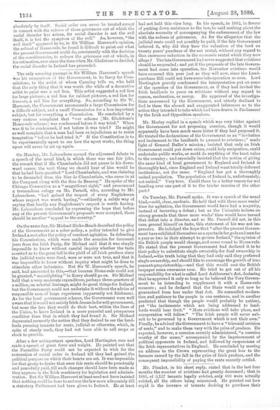On Tuesday, Mr. Parnell spoke. It was a speech of
the usual kind,—cold, clear, sardonic. He held that with three more weeks' time for agitation, the Government would have had a majority, instead of incurring a defeat ; but as the Unionists believe on strong grounds that three more weeks' time would have turned that defeat into a disaster, and as Mr. Parnell did not, in this case, ground himself on facts, this statement of his was not im- pressive. He indulged the hope that " after the present Govern- ment have exhibited themselves as a spectacle for gods and men for a year or two in their attempt to govern Ireland," the opinion of the British people would change, and come round to Home-rule. He stated that the present Government had declared it to be their policy to substitute single ownership for dual ownership in Ireland,—the truth being that they had only said they preferred single ownership, and should like to encourage the growth of true peasant-proprietorship,—and that this would cost the British taxpayer some enormous sum. He tried to get out of all his responsibility for what is called Lord Ashbourne's Act, declaring that he approved it only so long as he believed the Tory Govern- ment to be intending to supplement it with a Home-rule measure ; and he declared that the State would not now be guaranteed from loss under that Act. He counselled modera- tion and patience to the people in one sentence, and in another predicted that though the people would probably be patient, yet "the incitements which are being addressed to land- lords would bear fruit." " More evictions will take place, and exasperation will follow." "The Irish people will never sub- mit to be governed by a Government which is not their own." Finally, he advised the Government to have a "triennial revision of rents," and to make them vary with the price of produce. He expected, however, a coercion secretly administered, "a coercion worthy of the name," accompanied by the imprisonment of political opponents in Ireland, and followed by suspensions of the Irish representatives in England. He concluded by moving an address to the Crown representing the great loss to the farmers caused by the fall in the price of Irish produce, and the consequent impossibility of paying the rents recently settled.


































 Previous page
Previous page